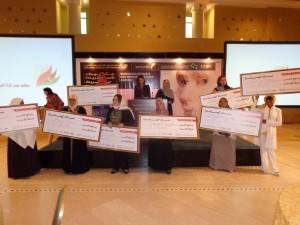By Sami Zaptia.

Tripoli, 19 June 2014:
The Libyan Business Women Entrepreneurship Award, organised by MEDA and supported by USAID, held a grant-awarding . . .[restrict]ceremony today at the Corinthia hotel. The event was attended by diplomats, the Tripoli Chamber of Commerce, the Misrata Business Council, as well as various business women and NGOs.
The matching grant awards, totaling LD 150,000, were handed out to seven winners of the best feasibility study competition as part of the “Do your project” competition. The matching grant meets the amount of money being invested by the participating business women.
The Libyan Business Women Entrepreneurship project, targeted at 200 women entrepreneurs, is being implemented by local partners the Libyan Women Forum and Consultants Alliance.
The project, which commenced last year, involved five different sections. The first, is the provision of training and mentoring to 200 business women which involved the transfer of skills and the creation of a network of Libyan business women.
The second and third phases of the project were awards for the best feasibility studies and today’s awarding of matched grants.
The project also entailed building local capacity for partners of the project as well as the provision of personal intensive training for today’s finalists.
The training involved helping participants in moving from an initial theoretical business idea to putting it on to paper, information on the Libyan market and workshops during which experiences were shared.
In total, there were 80 hours of training over 20 days provided, including finance, administration and management, marketing and leadership. The training was held in Tripoli, Benghazi and Zawia from June 2013 to May 2014 – all conducted by Libyans.
The project hopes to give Libyan business women the chance to grow and thrive during Libya’s transition period and help create a much-needed economy that is diversified away from the dominant hydrocarbon sector.
It also hopes to engender entrepreneurship that had been prevented under the previous dictatorship. It also hopes to encourage women to play an increased and critical role in ensuring that Libya builds a vibrant private sector and a country which can rise above instability and strife. [/restrict]










